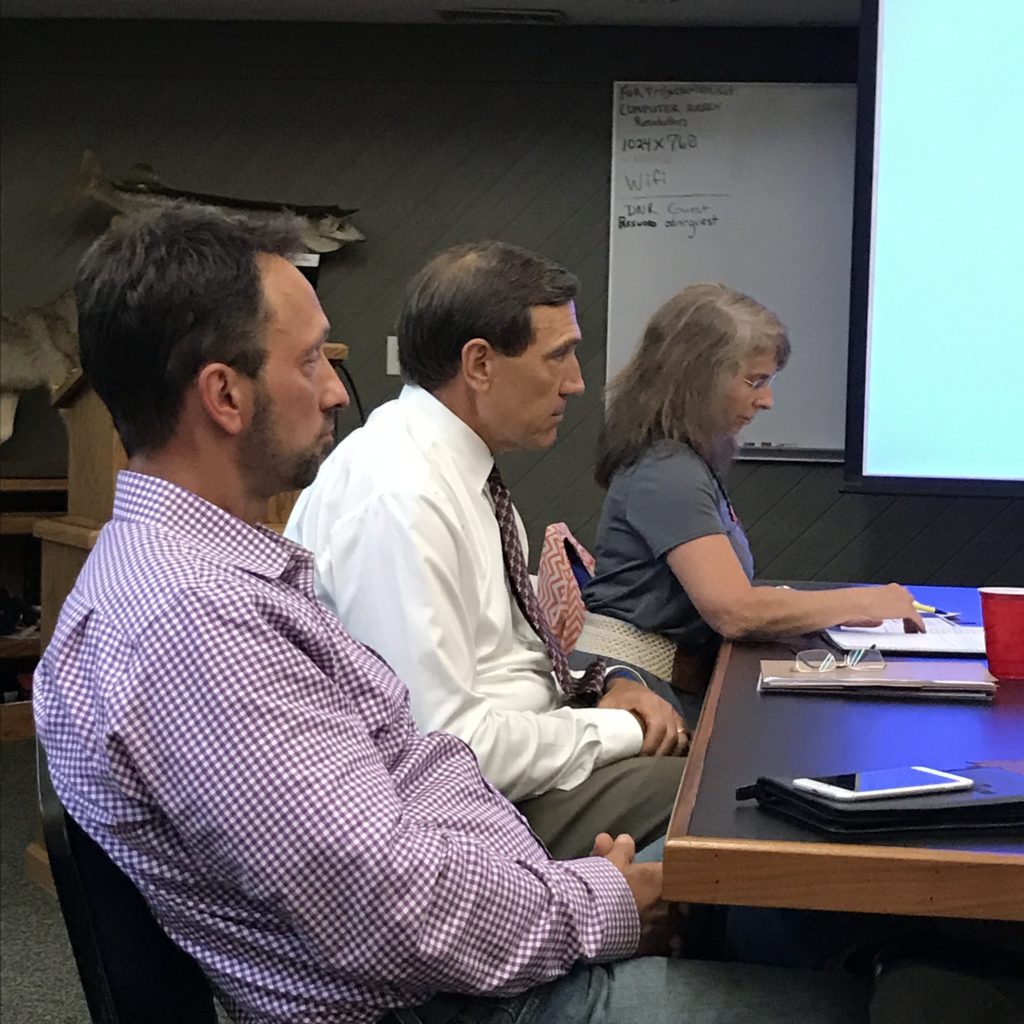Ohio Wildlife Council questions ‘purge’ of Division of Wildlife leadership

Three members of the Ohio Wildlife Council, from front to back, Mike Rex, Tom Vorisek, and Karen Stewart-Linkhart. Photo by Carrie Gloeckner.
New chief questioned on agency shake-up
COLUMBUS, Ohio – Following a series of events called “unprecedented”, a “purge” and a “decapitation of leadership” in the Ohio Department of Natural Resources Division of Wildlife, a regularly scheduled meeting of the Ohio Wildlife Council became a “baptism” for new division head, Mike Miller.
Normally the council would hear updates from various departments in the Division of Wildlife, discuss updates or potential changes in hunting, fishing or trapping rules for the state, but it was not the routine cut and dry meeting. Various council members commented repeatedly during the meeting that it was not their usual meeting. The room was full of concerned sportsmen/women, leaders of various hunting and fishing groups in the state along with others from ODNR and the Division of Wildlife. The audience listened to a lengthy questioning of the new chief’s decision to remove or transfer all of the top leadership at the Division of Wildlife representing 156 years of experience with the division and managing wildlife.
The meeting started off with the new chief being introduced and Miller briefly talked about his experience and passion in which he even choked up briefly. Following an update on an in depth poaching ring investigation (more later on that in a separate article on the Meigs Independent Press), the meeting quickly moved into a lengthy questioning session of Miller. Miller previously served as head of the Division of Watercraft since 2014 and has been overseeing the transition of the Division of Watercraft under and into the Parks and Preserves Division. Miller was named as Chief of the Division of Wildlife on July 5, 2017 by Director of the Ohio Department of Natural Resources, James Zehringer, following the “return to retirement” of Ray Petering. Petering’s forced exit followed on the heels of Mike Budzik, top conservation advisor to Gov. John Kasich, also leaving. Budzik has been vocal at his disapproval of proposed changes to the way the division is managed. His voice has not been alone as sportsmen across the state have expressed concerns as well, especially following a series of events replacing or removing all of the top leadership at the Division of Wildlife in a matter of days.
Council member Tom Vorisek began his questioning with reading the legal duty of the Wildlife Council. “Since you are obviously new in your position, I wanted to just give you a refresher on the job, the lawful job the Wildlife Council has,” Vorisek said, directing the statement to Miller.
Vorisek read from the Ohio Revised Code Section 1531.03, specifically a section which states, “The Ohio Wildlife Council shall investigate, consider, and make recommendations in all matters pertaining to the protection, preservation, propagation, possession, and management of wild animals throughout the state.”
Vorisek noted that this was what the council is required to do by law. He then continued, “Therefore the law requires us to investigate the dramatic changes that have taken place when the entire leadership structure of the division is decapitated. We must try to get to the bottom of it. With that said, I have a couple questions, Chief Miller.”
Vorisek then went step by step into the events surrounding Miller’s replacement of Petering as chief of the Division of Wildlife and the rapid timeline of events which followed within a few days removing those at the highest level of leadership in the division. Vorisek asked Miller about the July 5 announcement by Direct Zehringer that Miller was taking the position as chief, “How long had you known about this change in position before the announcement was made public?”
“Well, I accepted the position on that morning,” Miller responded. Again, Vorisek asked the question of “how long had you known” of Miller. Miller said he did not know about the change in position until that day. Miller said there was discussion with the Human Resources department on it that day.
Vorisek then questioned Miller on the Civil Service declassification of the positions assistant chief’s positions. He asked Miller if he had input into the decision to remove the Civil Service protection for the assistant chief positions. Miller said he did not. Miller was then asked if he agreed with the decision to change it from classified positions to and unclassified positions. Miller responded, “I look at things, as decisions are made as far as management all the time. I think each chief when he has a new position that he is in there’s always changes in personnel at many times. Some times at different times throughout people’s careers. So as far as me having a new team of people to work with, yeah, I do agree with a new team for me to work with.”
Vorisek thanked Miller for the response, but said that was not the question he had asked. Vorisek stated the question again, “Do you agree with the specific change of declassifying the assistant chiefs position, and no longer offering civil service protection. And if I can clarify maybe further, that might help you, we now turn that position from more or less a staff position to a political patronage position. So, do you agree with that change?”
Miller responded that he did not have any decision in that change. Miller said those decisions to change the positions came from a “higher level of government” than he is, however, he still did not answer the question of agreeing with it or not. Vorisek again asked him directly if Miller agreed with the change in classification. Miller responded, “This change? Yes, for declassifying to come into compliance with how other departments are in state government? Yes, I don’t have any choice in that matter. So if my supervisor or my director’s office or my assistant director’s office or deputy director’s office says this is the direction we are going in I have no decision in making any of those changes. I have no alternative but to change. It’s like with any other business. When leadership of an agency or a business makes a change, then those changes are made. So, I do not have a change at this time.”
Vorisek followed with asking, “Do you have any plans, or have you had any conversations within the Ohio Department of Natural Resources to further remove civil service protections from any additional layers within the Division of Wildlife positions such as other EPG members or other District Managers?”
“I do not,” Miller said followed by Vorisek asking if there were any conversations or plans to do that. Again, Miller responded that he did not.
“So two days after you were named chief, I should clarify that. Two business days Chief Miller after you were named chief, Assistant Chiefs Susie Vance and Scott Hale, whose positions had just lost their civil service protection, they were terminated from their positions within the Division of Wildlife. Who made that decision,” Vorisek asked.
“They were transferred to the Division of Parks and Watercraft. And that was a decision that was made with the Human Resources department and the Department of Natural Resources with the director’s office, myself and the assistant directors,” responded Miller.
“So let me make sure I understand, I apologize, I know where they were transferred but that was not the question. The question was, they were terminated from their positions, I am asking very specifically and I do apologize, it’s a specific question. Who made the decision to remove them?
“Those were decisions that were made with myself, the assistant director, and the chief of HR and the director’s office,” answered Miller.
“So you were involved in that decision making,” asked Vorisek. Miller responded “yes.”
“Why were they removed? And I speak specifically about Assistant Chief Vance and Assistant Chief Hale. Why were they removed,” Vorisek asked.
“They were removed to help us develop a team to work together and also to assist the other divisions in some important decisions with one of our goals of access, opportunity, and customer service to work with our sister divisions to help create other opportunities within state parks and wildlife,” Miller said.
Vorisek then asked what the specific criteria for their removal was. Miller responded, “We were looking for me to have a team to move in a new direction for creating access, opportunity and customer service goals that I have and to assist other agencies and divisions with creating those same programs and helping develop those relationships.”
Vorisek asked when the decision was made to remove the assistant chiefs. Miller said it was either Friday or Monday morning (July 7 or July 10 respectively). Miller said it was a continuing conversation as he was evaluating and assessing temporary work levels.
“Was the impact on their careers, and I speak again of Susie Vance and Scott Hale, was that part of the criteria that you used in your decision making process to have them removed,” Vorisek asked. Miller indicated he didn’t understand the impact on their careers.
“Susie Vance and Scott Hale have been career employees with this agency for an awfully long time. Was the fact they were being removed from their position and the impact on their career, was that part of the consideration, I should say it differently. Was that part of the criteria in deciding to remove them, the impact on their careers,” Vorisek asked and Miller responded it should not impact their careers.
“Once again, with all due respect, you said you made the decision to terminate those two individuals from their positions, and have them removed,” Vorisek continued outlining the series of events leading to the removal of the two assistant chiefs.
“I give you the benefit of the doubt, Mike, and let’s say you moved into your office on July 5. July 6 was a Thursday. July 7 was a Friday. The removal occurred Monday morning at about 8 a.m. or so. So you were on the job for perhaps for a total of three days, how does one evaluate, and I am just immensely curious at this since I have been in personnel for a long time myself. How does one evaluate the competency, the capability, the qualities, the personnel file, and all of the things that go into a career employee when you have been on duty for perhaps two or three days to then come to the conclusion that those two individuals needed to be removed?”
“Well, it’s more than just that. I’ve also worked for the agency for 23 years. I’ve also interacted and worked with those folks for the three years I have been out at watercraft and then in various types of projects. So to say that criteria is just based on three days that I was in the position it was a lot longer time than that,” Miller said and added they would be “filling very useful roles” and that it would be benefiting Ohio sportsmen. At that point, he did not elaborate on how removing the two assistant chiefs from the division overseeing hunting and fishing in the state and placing them in the Division of Parks and Watercraft would benefit Ohio sportsmen.
Council member Vorisek continued to press for an answer and asked if there was something lacking in the performance of Vance and Hale. Miller said, “I did not find anything in their performance as far as their projects or the work they did. I think they are very valuable as far as attaining goals of opening up additional hunting and fishing opportunities in Ohio State Parks and Watercraft.”
At this point, the focus remained on whether the transfer of Hale and Vance was voluntary or not. Vorisek asked if this was a voluntary move made by Vance and Hale or were they told to make the move. Miller said it was an “HR question” and that they made the choice to take the other positions. “They made the decisions whether to go up and sign or not,” Miller said.
Vorisek again asked if Vance and Hale were given the opportunity to remain in their positions or not. Miller stated again that they chose to sign to the transfer.
“I apologize that I am doing such a poor job asking these questions, so I will try re-clarify. Was Susie Vance and Scott Hale, were they given the opportunity to stay in their current positions? This, I would (inaudible), to me it is a yes or no question. I do apologize for trying to make things simple. Where they given the opportunity to stay in their current positions as assistant chiefs in the Division of Wildlife?”
Miller responded, “From my understanding, from talking with HR, if you are unclassified and the same as with other positions if you are classified with similar positions and descriptions, people can be moved around to other position.”
“That is not answering the question, with all due respect, Chief. Were they given the opportunity to maintain their current job, their current role as assistant chiefs? Were they given that opportunity,” Vorisek asked.
“They were asked to transfer to the Division of Parks and Watercraft,” Miller said and added that when he was offered the position at the Division of Parks and Watercraft, he did so.
“One of the things as we investigate, what we are hoping for is a sense of transparency. And, I find it a little troubling that, and again, perhaps it’s my deficiencies, but find it a little troubling that you are unwilling to answer that question, but I will move on. So, I don’t understand that, but I will move on,” Vorisek said.
He then asked who decided to hire Assistant Chief Mike Leurs. Miller said that it was a decision involving in consultation with the assistant director, Human Resources and the director’s office, but Miller said, “It was a group decision, we all discussed it and in the end as chief I have final say so over who is going to be assistant chief.”
When asked how long Miller had know Leurs, Miller initially said three years and then adjusting saying two and half, since Leurs came to the department. Vorisek asked when he interviewed Leurs for the position as assistant chief. “I talked to him last week,” Miller said. He said he had spoken with Leurs on several days last week.
“Yes, at the same time I have known Mike for I think two and half years or so when he first came to the department. I was familiar with his background,” Miller said.
“But you interviewed him for that specific position. The day you were hired on Wednesday apparently or the day after? You said you started talking to him on Wednesday. Ok, so I have to hand it to you, you’ve had a busy couple of days here. Let me move on to Scott Sharp. How long have you known Scott Sharp,” Vorisek asked.
Miller said he has known Sharp since he was first hired as a Wildlife Officer. Miller related the decision was the same as far as discussion on hiring Sharp as it was Leurs. Vorisek asked Miller about what qualifications Sharp has and Miller said he had been a Wildlife Officer and background with wildlife forensics. He also worked with Ohio State Parks in management.
“Chief on Monday morning, there were a series of removals that occurred within the leadership structure of the Ohio Division of Wildlife,” Vorisek asked naming off several individuals and asking whose decision it was to remove them. Miller said it was the same, a conversation with the chief of Human Resources and with the director’s office. Vorisek asked if Miller made the decision and Miller said yes. Vorisek then asked why he made the decision to remove an additional five people from their positions.
“To work, for myself to have a team and assist the other divisions out there with the needs that they have,” Miller said.
Vorisek continued, “How are you able to determine, in these same three days, I’m not trying to make a joke out of it. How are you able to determine in these first three days, of not only dealing with all of the assistant chiefs, and determining their capability, their competency, their skill set, that they needed to go out of these positions, and evaluate the two replacements, and bringing them back in these three days and then subsequently in the same time period, you were able to evaluate these other five individuals, which are career individuals, and by my tally, I went and looked at it, after this happened it’s some 156 years of experience with the Division of Wildlife that was removed from their positions on Monday morning. A 156 years of that, of experience up there, that’s what it appears to this agency. How were you able to determine in three days that those five individuals needed to go from their positions?”
Miller said he knew the individuals from working with the Division throughout this career with the agency, “As far as the ability for me to understand people, their personalities and the work that they do, this was all about assisting and helping out another agencies. We are in the process of trying to maximize angler and hunter opportunities on all of our DNR properties. The Division of Parks and Watercraft, they are the largest in holder of public waters in the state of Ohio inland. They are also equal to the Division of Wildlife in the amount of land for hunting, and fishing, and trapping opportunities in the state of Ohio inland. They own as much land roughly as the Division of Wildlife does. They haven’t had a communications person probably in five or six to help with communications and issues that they have. And Greg Waite is a very good trainer. He is an excellent trainer with the Natural Resource Officers in that division. Greg is a very useful person to help bring their training up to speed.”
“I thank you and I appreciate, I think the council appreciate the opportunities that these individuals have been given. I question that someone that is in charge of all law enforcement in the state of Ohio, the top game warden that it could be considered anything other than a demotion when you are effectively running a pulse in it, but I will set that aside for now. I would ask though the same question about five individuals that were removed on Monday morning. Where those five individuals given to stay in their current positions,” Vorisek asked.
Miller responded, “They could have chosen to go to the Division of Parks and Watercraft or they could have refused to not do that. But, under (inaudible) management, management has a right under state law and HR policies from according to the Human Resources chief of our department, within certain job classifications, you can be moved to different positions if senior management so decides. As it happened to myself.”
“Thank you, but I don’t think the question, Chief Miller, was did you have the authority. The question was did those five individuals were they given the opportunity to stay in their current positions,” Vorisek asked.
“No, they needed move to Parks and Watercraft,” Miller said. Then Vorisek asked what would happen if they had not moved, what would have happened to them.
“That would be a question for the HR director because I am not the HR chief to understand that. They signed their waiver to voluntarily move that day.”
Vorisek continued, “You said you had evaluated these five individuals, for the course of their career, so in the 20 years, you said that earlier, in the 20 years you have known them, what did you find lacking in them over the 20 years that then you came to the judgement three days into your job that they needed to go. So, what was the deficiencies, the flaws, the skill set deficiencies or other things that you determined in your 20 year work history prior to taking this job a week ago, what was it you discovered among those five people that formed you opinion that they needed to go within three days after you came into this office, came into your job?”
“I don’t have any deficiencies with them or anything against them. I think that the opportunity that they have to help out sister agencies in the division, it makes it better for then entire department of Natural Resources. It sort of makes it better for all of us. It makes it better for the Division of Wildlife and Water Resources, Parks and Watercraft and Forestry. The roles that they are filling are going to benefit the entire Department of Natural Resources,” Miller said.
Vorisek said Miller had referred to his experience knowing these people and asked what opinions formed to arrive at the conclusion he did. “What in their earlier work history led you to believe they needed to go.
Miller said he was trying to explain to Vorisek that he had not known the individuals in question just three days. Vorisek said he was not trying to say that and moved on with the next question.
“Were they removed as a political purge,” Vorisek asked.
“No, they were removed to help us assist the other divisions,” Miller said.
“Were they removed as some sort of political payback or retribution,” Vorisek asked with Miller simply replying, “No.”
The questioning continued as council member Karen Stewart-Linkhart also asked about the rush remove individuals that Miller had praised as being highly qualified from their positions to then leave a deficit in leadership for the Division of Wildlife. She said, “Our job, our job is about the Division of Wildlife. I’m not saying we don’t care about the department, but to take all of our top people and disperse them across the department because they need them, well, maybe, we could have worked toward that. I mean, you say it was voluntary. It’s voluntary if they sign or they are gone. I mean that is essentially it.”
Vorisek interjected, “By it’s very definition, that’s not voluntary.”
“That’s not voluntary,” Stewart-Linkhart agreed.
“When you’re unclassified,” Miller began and then Stewart-Linkhart continued, “I know. I understand but we haven’t seen this kind of purge.”
Vorisek followed, “We are talking about classified verses classified specifically.”
“And it’s our job, this is our job do what is best for the Division of Wildlife,” she finished.
Miller said he has met with his new assistant chiefs and he already has some names in mind to fill the vacant leadership positions within the Division of Wildlife. He said some of the names they had, the people were on vacation.
“Are you concerned Chief with the rest of the Division of Wildlife staff how they are going to see and perceive this purge that has just taken place,” Vorisek then asked how Miller was going to address the consequences of such a purge, “how are you specifically going to address the moral issues and as important the competency issues. You just had 156 years of experience walk out the door. Virtually the entire EPG level, that is the executive planning group level which is just under the assistant chiefs, has now been wiped out. How do you, how are you going address the moral number one and the competency number two?”
“Number one, moral has been an issue for a number of years. At least 10 years that I can think of, probably started about two years before the current administration is when I think moral really hit rock bottom. This transition is hard on staff. It’s hard on the entire division. It’s hard on you guys, and I understand that. I guess what I am asking is you look at the end product of what’s going to take place over the next couple of years. As far as the people going to be put into the temporary work level positions right now until get the positions filled for a full-time basis. I just got there. I am catching up on many things. Wildlife is a very busy complicated agency like Parks and Watercraft and it takes some time to get up to speed on things. So that is what I am currently trying to do. Is this a big decision to go through, yes it is. This is the most challenging thing I have done in my entire life,” Miller said maintaining that he believed this was all a good decision.
“I think you are going to see a lot of benefit for the sportsmen throughout the state in particular from Parks and Watercraft. There’s a lot of opportunities we haven’t had out there before. You are going to see greater cooperation between the agencies in the department,” Miller added.
Vorisek asked again about the competency issue. Miller said the positions would be filled.
Stewart-Linkhart said, “But there is nobody left to train them.”
Miller held in his confidence that the team his was forming would be up to the task. Miller said that the employees of the Division of Wildlife were very dedicated and preform under tough circumstances.
“Interesting when you mention the moral issues, the moral issues have been around for 10 years, something like that. I would offer that if you think that it is going to improve moral by summarily going in and purging out the entire leadership, with virtually no input certainly from the Wildlife Council, no discourse, almost in the dark of the night, with political retribution and payback written all over it, if you thank that’s going to improve moral – that will be interesting and I wish you the best of luck on that,” Vorisek said.
Vorisek then specifically asked about transfer of any funds or positions or salaries being split, funds going out from the Division of Wildlife into any other division. He also asked if there was anymore removals forthcoming or to be expected. Miller said not at this time.
“Director Zehringer said in his July 10 to the entire Ohio Department of Natural Resource staff, ‘Chief Miller is putting together a leadership team that will help implement new initiatives.’ What are these new initiatives,” Vosrisek asked.
“To work on access, opportunity and customer service issues,” Miller said.
Vorisek then asked if the new initiatives were part of the criteria to remove the Division of Wildlife leadership. Miller said the email from Director Zehringer implies that is the case, however, Miller again stated that the new initiatives were “access, opportunity, and customer service.”
Vorisek asked if the former employees lacked anything required to accomplish those goals. Miller continued to talk about the opportunities that haven’t taken place in his career that he would like to see moving forward. He said he would like to have team to do that to which Vorisek said that did not answer the question. He asked it again and Miller discussed the ability of those individuals to accomplish those goals in other divisions within the Department of Natural Resources. Miller still did not answer the question. Vorisek said they are incredibly talent people and it was a loss for the Division of Wildlife. Miller went back into discussing the ability to remove classified and unclassified positions. Vorisek asked what deficiencies they had to remove them from the division. Miller said they had no deficiencies. Miller held to the position that there were new initiatives for “access, opportunity, and customer service.”
Vorisek and Stewart-Linkhart questioned the rush to remove the leadership so quickly, leaving the Division of Wildlife in a lurch. Vorisek stated again that this not business as usual for the Wildlife Council.
“This is not business as usual folks, we are trying to do our job. This is the largest earthquake to hit the Division of Wildlife, perhaps in its history. This is unprecedented in 50 years to have this kind of decapitation occur at the top and I simply say that, and I am not speaking for anyone else, but for myself. I will not apologize for doing our job. We will not apologize for doing the job the law requires us to do,” Vorisek said, ending with a question about additional funding. Miller responded that the division did not need additional funding.
Vorisek offered closing thoughts for the new chief, “I would ask that we all reflect upon the seven, perhaps eight, that summarily dismissed with no reasons. It wasn’t a voluntary reassignment. Many of those individuals if not everyone of them, are devastated. They put their life blood into this agency. This was their careers. Now their careers have been irreparably changed, perhaps irreparably harmed and their reputations besmirched, OK. And their crime? I don’t see a crime here. I see no deficiencies in their sterling record for why these employees who have again, done so much for this agency, were summarily pushed out. So I apologize for anything we have done to make you feel uncomfortable, but I fail to loose sight of the human aspect. We can talk about the politics and the funding, but there are seven or eight individuals that are now devastated. And we are all left asking the question as to why. So as we push forward and do great things in the state of Ohio, one of the substantial hurdles we all face is trust and transparency. Because those two things have taken a serious hit in my thinking for the way this was conducted, the way this has been handled and going forward. And I can simply say, thank you very much for answering these questions, but I would suggest that this issue is probably not going away. We’re not done with it. Thank you and I thank everyone for their patience.”
As the meeting closed, Council member Eric Hirzel, Sr., offered a few thoughts on previous chief Petering, “He was probably one of the most dedicated and passionate, hardworking chiefs I have seen in the state here. I just wanted to pass that along.” At that point the room erupted with applause for the former chief.
The Meigs Independent Press will have more on this developing story.








